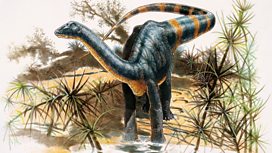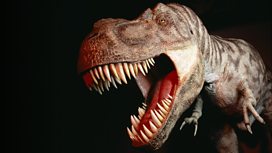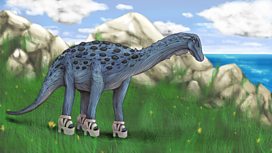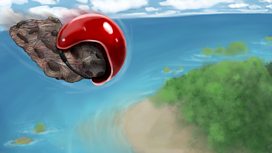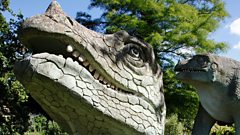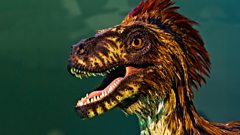Dinosaurs
Brett Westwood explores how these ancient beasts are influencing our stories, films and science. From 2015
Our collective imaginations go wild at the thought of lumbering, ferocious beasts that were so powerful they once ruled the earth. T Rex scares us witless and diplodocus was an astonishing creature of breath taking proportions. It is no wonder then that dinosaur books, especially for children, appeared in the early nineteenth century and are still flying of the shelves today.
Dinosaur exhibitions always draw throngs of people. From the Crystal Palace dinosaurs in London built in the mid 19th Century to the wonderful animatronic models in today's modern museums, these ancient beasts speak to us of a different planet earth, lost in deep time, gone for ever. Yet they have left us bones and teeth that are still revealing amazing facts. Recent science shows most dinosaurs were not cold bloodied reptiles but warm blooded, feathered and colourful. They lived for 160 million years, occupying a warm humid planet rich in vegetation.
When we use the world 'dinosaur' we mean it as a derogatory term for someone who can’t adapt but nothing could be further from the truth. These were supreme rulers that were brought down by an Act of God that defies imagination. So huge was the impact of the meteorite that the earth went cold and dark. Dinosaurs though will never leave us, we will take them with us into the future, in our stories, films and science and we will learn from their old bones ever more details about life on earth, and how even the most successful creatures on earth are, in reality, so fragile.
Originally broadcast in a longer form 28th July 2015
Original producer : Sarah Pitt
Archive Producer for Βι¶ΉΤΌΕΔ Audio in Bristol : Andrew Dawes
Last on
![]()
We think of them as fearsome giants but many dinosaurs were quite modest in size.
![]()
Some had 15cm-long teeth while others had brains the size of walnuts.
![]()
The World According to Magyarosaurus
Watch a Natural Histories comedy clip featuring a dwarf dinosaur.
![]()
Meteorites
Brett Westwood explores how fragments from other worlds have influenced our lives.
Clips
-
![]()
The original Jurassic park
Duration: 03:15
-
![]()
The World According to Magyarosaurus
Duration: 01:48
-
![]()
'Many, if not most, dinosaurs had feathers'
Duration: 01:59
-
![]()
Magyarosaurus: the dinosaur that shrank
Duration: 01:11
Professor Paul Barrett

His main areas of interest are in , describing new dinosaurs, and in large-scale evolutionary processes, such as the coevolution of animals and plants through time.
During the course of this work, he has travelled extensively to work on museum collections around the world and conducted fieldwork in China, the UK and South Africa. He is currently President of the , holds numerous editorial positions and sits on the councils and committees of several learned societies.
Twitter:
Professor Mike Benton

He was elected for his fundamental contributions to understanding the history of life, particularly biodiversity fluctuations through time. He has led in integrating data from living and fossil organisms to generate phylogenies – solutions to the question of how major groups originated and diversified through time.
This approach has revolutionised our understanding of major questions, including the relative roles of intrinsic and extrinsic factors on the history of life, whether diversity reaches saturation, the significance of mass extinctions, and how major clades radiate.
Dr Kelvin Corlett

Specialising in scientific vocabulary, he is part of the editorial team currently working on the ongoing project to completely revise the OED.
Dr Melanie Keene

She is theΒ author of .
Adrienne Mayor

Her two books on pre-Darwinian fossil traditions in classical antiquity and in Native America;Β and have opened up a new field within geomythology.
°Υ·ΙΎ±³Ω³Ω±π°ω:Μύ
Dr Ellinor Michel

In addition to her academic research she was the acting field director and assistant project director for a US-NSF research training programme on tropical lakes and Executive Secretary for the . She continues to work on digital access for biological information.
Professor John O'Maoilearca

His latest book – on animals, cinema, and philosophy – is entitledΒ .Μύ
Broadcasts
- Tue 28 Jul 2015 11:00Βι¶ΉΤΌΕΔ Radio 4
- Mon 3 Aug 2015 21:00Βι¶ΉΤΌΕΔ Radio 4
- Sun 13 Mar 2022 06:35Βι¶ΉΤΌΕΔ Radio 4

